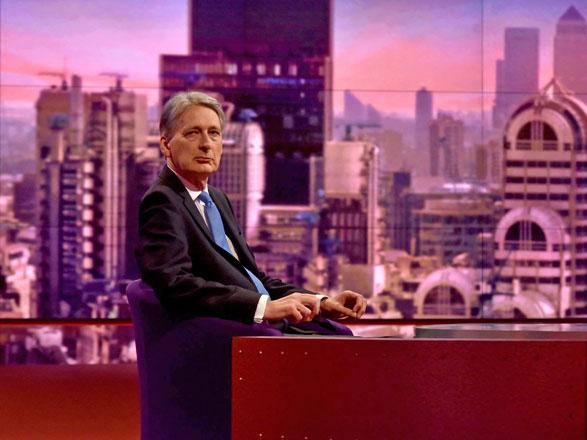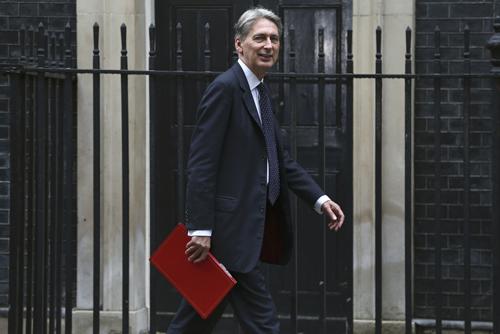You are here
UK’s Hammond sees light at end of austerity tunnel
By Reuters - Mar 11,2018 - Last updated at Mar 11,2018

Britain's Chancellor of the Exchequer Philip Hammond attends the Marr Show at the BBC in London on Sunday (Reuters photo)
LONDON — British Finance Minister Philip Hammond said on Sunday he might be able to relax his grip on public spending at the end of this year, but he stuck to his plan to cut the country's high debt levels.
Britain's budget deficit has probably fallen to about 2 per cent of annual economic output in the current financial year, which would be its lowest since 2002 and way down from the 10 per cent it reached in 2010, when many government departments began cutting spending sharply.
"There is light at the end of the tunnel because what we are about to see is debt starting to fall after it's been growing for 17 continuous years," Hammond told BBC television ahead of a half-yearly update on the public finances on Tuesday.
"That is a very important moment for us. But we are still in the tunnel at the moment. We have to get debt down."
Faced with uncertainty about what leaving the European Union will mean for the world's sixth-biggest economy and frustration among voters who have coped with eight years of austerity, Hammond has already pushed back a target of wiping out the deficit into the mid-2020s.
He came up with extra spending in a budget plan in November.
But he remains under pressure from the opposition Labour Party and some lawmakers in his Conservative Party to spend more on the over-stretched state health system and other services.
Labour's finance spokesman John McDonnell said Hammond's performance was nothing to celebrate.
"Last year, we had the lowest economic growth in the G-7 countries," he said on Sunday. "Wages are below what they were in 2007-2008, before the banking crisis."
He said managers in the health service, school head teachers and local government official were bearing the brunt of the Conservatives' economic policies, and up to 11 million people would be hit next month by cuts in benefits.
Stressing the limits on his room for manoeuvre, Hammond told the BBC it was not clear that recent improvements in Britain's economy — such as a pickup in weak productivity growth — represented a long-term change.
"We need to look at what is happening sustainably in the economy," he said.
"But if there is the flexibility, the space to do something, then we will decide in the autumn how to do that," he said, adding the government would continue to balance the need for investment against the push to bring down debt.
Britain's overall public sector net debt totalled 1.7 trillion pounds in January, 84 per cent of gross domestic product and more than double its level before the financial crisis. Hammond says that restricted Britain's ability to respond to future economic shocks.
Hammond confirmed he plans no new tax or spending measures in Tuesday's budget statement which will be largely a low-key update of economic forecasts. He is also due to launch some policy reviews.
Related Articles
LONDON — Britain will fill a gap of as much as £4.5 billion ($5.8 billion) in funding for agriculture, universities and its regions that wil
British Finance Minister George Osborne offered a sweetener to pensioners on Sunday, less than two months before a national election, but promised there would be no big giveaways for voters when he sets out his final pre-vote budget.
British Finance Minister George Osborne spelled out plans for more spending cuts on Monday, betting that voters will accept his tough approach to fixing the economy and give an election victory to his Conservative Party next year.















